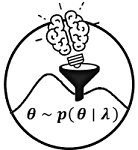elicit.losses module#
- elicit.losses.preprocess(elicited_statistics: Dict[str, Tensor]) Dict[str, Tensor][source]#
Preprocess elicited statistics such that they have the required format for computing the individual losses between expert- and simulated statistics.
- Parameters:
- elicited_statisticsdict
dictionary including the elicited statistics.
- Returns:
- preprocessed_elicitsdict
dictionary including all preprocessed elicited statistics which will enter the loss function to compute the individual loss components.
- Raises:
- AssertionError
elicited_statisticscan only have 2 dimensions (i.e., tensor of rank 2)
- elicit.losses.indiv_loss(elicit_expert: Dict[str, Tensor], elicit_training: Dict[str, Tensor], targets: List[Target]) List[Tensor][source]#
Computes the individual loss between expert data and model-simulated data.
- Parameters:
- elicit_expertdict
dictionary including all preprocessed elicited statistics
- elicit_trainingdict
dictionary including all preprocessed model statistics
- targetslist
user-input from
elicit.elicit.target()
- Returns:
- indiv_losseslist
list of individual losses for each loss component
- elicit.losses.total_loss(elicit_training: Dict[str, Tensor], elicit_expert: Dict[str, Tensor], targets: List[Target]) Tuple[Tensor, List[Tensor], Dict[str, Tensor], Dict[str, Tensor]][source]#
Computes the weighted average across all individual losses between expert data and model simulations.
- Parameters:
- elicit_trainingdict
elicited statistics simulated by the model.
- elicit_expertdict
elicited statistics as queried from the expert.
- targetslist
user-input from
elicit.elicit.target()
- Returns:
- lossfloat
weighted average across individual losses quantifying the discrepancy between expert data and model simulations.
- individual_losseslist
list of individual losses for each loss component.
- elicit_expert_prepdict
dictionary including all preprocessed expert elicited statistics.
- elicit_training_prepdict
dictionary including all preprocessed model-simulated elicited statistics.
- elicit.losses.L2(loss_component_expert: Tensor, loss_component_training: Tensor, axis: int | None = None, ord: str | int = 'euclidean') Tensor[source]#
Wrapper around tf.norm that computes the norm of the difference between two tensors along the specified axis. Used for the correlation loss when priors are assumed to be independent
- Parameters:
- loss_component_experttf.Tensor
preprocessed expert-elicited data
- loss_component_trainingtf.Tensor
preprocessed model-simulated data
- axisint, optional
Axis along which to compute the norm of the difference.
- ordint or str
Order of the norm. Supports ‘euclidean’ and other norms supported by tf.norm. Default is ‘euclidean’.
- class elicit.losses.MMD2(kernel: str = 'energy', **kwargs)[source]#
Bases:
objectComputes the biased, squared maximum mean discrepancy
- Parameters:
- kernelstr, (“energy”, “gaussian”)
kernel type used for computing the MMD. When using a gaussian kernel an additional ‘sigma’ argument has to be passed. The default kernel is “energy”.
- **kwargs
additional keyword arguments that might be required by the different individual kernels
- Raises:
- ValueError
kernelmust be either ‘energy’ or ‘gaussian’ kernel.sigmaargument need to be passed ifkernel="gaussian"
Examples
>>> el.losses.MMD2(kernel="energy")
>>> el.losses.MMD2(kernel="gaussian", sigma = 1.)
- __init__(kernel: str = 'energy', **kwargs)[source]#
Computes the biased, squared maximum mean discrepancy
- Parameters:
- kernelstr, (“energy”, “gaussian”)
kernel type used for computing the MMD. When using a gaussian kernel an additional ‘sigma’ argument has to be passed. The default kernel is “energy”.
- **kwargs
additional keyword arguments that might be required by the different individual kernels
- Raises:
- ValueError
kernelmust be either ‘energy’ or ‘gaussian’ kernel.sigmaargument need to be passed ifkernel="gaussian"
Examples
>>> el.losses.MMD2(kernel="energy")
>>> el.losses.MMD2(kernel="gaussian", sigma = 1.)
- __call__(x: Tensor, y: Tensor) Tensor[source]#
Computes the biased, squared maximum mean discrepancy of two samples
- Parameters:
- xtensor, shape=[B, num_stats]
preprocessed expert-elicited statistics. Preprocessing refers to broadcasting expert data to same shape as model-simulated data.
- ytensor, shape=[B, num_stats]
model-simulated statistics corresponding to expert-elicited statistics
- Returns:
- MMD2_meantensor, shape=[]
Average biased, squared maximum mean discrepancy between expert- elicited and model simulated data.
- clip(u: Tensor) Tensor[source]#
upper and lower clipping of value u to improve numerical stability
- Parameters:
- utf.Tensor, shape=[B, num_stats, num_stats]
result of prior computation.
- Returns:
- u_clippedtf.Tensor, shape=[B, num_stats, num_stats]
clipped u value with
min=1e-8andmax=1e10.
- diag(xx: Tensor) Tensor[source]#
get diagonale elements of a matrix, whereby the first tensor dimension are batches and should not be considered to get diagonale elements.
- Parameters:
- xxtensor, shape=[B,num_stats,num_stats]
Similarity matrices with batch dimension in axis=0.
- Returns:
- diagtensor, shape=[B,num_stats]
diagonale elements of matrices per batch.
- kernel(u: Tensor, kernel: str) Tensor[source]#
Kernel used in MMD to compute discrepancy between samples.
- Parameters:
- utensor, shape=[B,num_stats,num_stats]
squared distance between samples.
- kernelstr, (“energy”, “gaussian”)
name of kernel used for computing discrepancy.
- Returns:
- dtensor, shape=[B,num_stats,num_stats]
discrepancy between samples.

